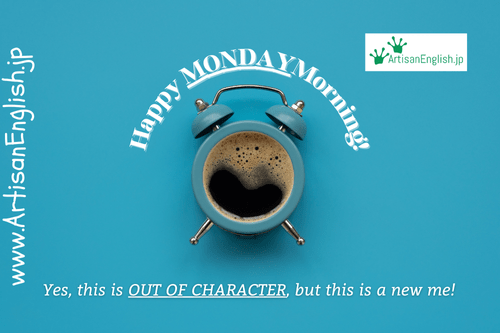
YouTube / iTunes / Spotify / Radio Public / Pocket Casts / Google Podcasts / Breaker / Overcast
Listen to ArtisanEnglish.jp posts & lesson intros here.
Phrase: Out of character
Have you ever found yourself doing something completely out of character?
Something that you wouldn’t normally do, something that surprises even yourself?
When we say something is out of character, we mean it is not typical of a person’s personality or behaviour.
It’s like stepping outside your comfort zone, outside the boundaries of who you think you are or what others perceive you to be.
There are moments in life when we act out of character, which can be quite perplexing.
Maybe you, a reserved and introverted person, suddenly find yourself teaching English to hundreds of students a day in a Japanese high school.
Oh wait, that’s me.
Or perhaps you, a cautious and risk-averse individual, decide to go bungee jumping naked on a whim.
Oh, wait, that’s me again.
These instances of acting out of character can be both exhilarating and bewildering.
Acting out of character is often a sign of personal growth or an indication of breaking free from self-imposed limitations.
So, I bungee jumped naked as a personal growth and character-building experience.
Ok.
I suppose we can say it is an opportunity to explore new facets of our identity and challenge our preconceived notions about ourselves.
I view travel as an opportunity to embrace actions that are out of character, which can lead to self-discovery and a greater understanding of our capabilities.
Now, you should recognize that doing something out of character doesn’t necessarily mean compromising your values or beliefs.
Instead, it can be a chance to expand your comfort zone and engage in experiences that may broaden your horizons.
So, don’t be afraid to step out of character occasionally – you might surprise yourself.
Flesch-Kincaid Readability Test
This post is understandable by someone with at least a 9th-grade education (age 15).
On the Flesch-Kincaid reading-ease test, this post scores 57.
The easier a passage is to read, the higher the score on a scale of 0 – 100.

